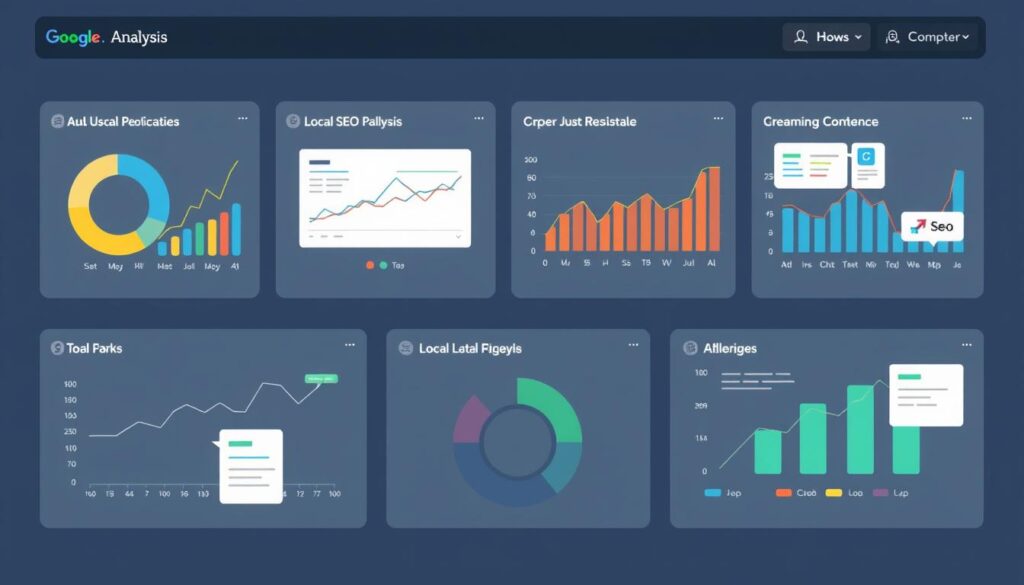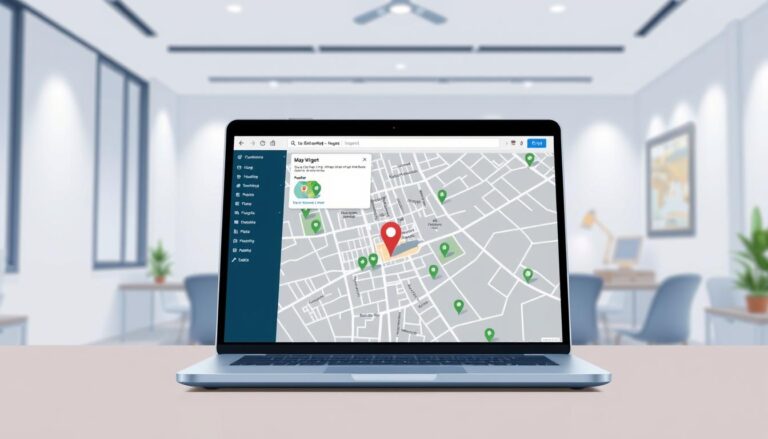Getting found online is crucial for businesses, especially those serving local markets. This is where local SEO comes into play, helping businesses boost their visibility through effective keyword research.
By focusing on the right keywords, you can significantly improve your business’s online presence, making it easier for customers to find you. Think of it like opening a digital map directly to your company’s door, guiding online searchers to your services based on their location.
In this guide, I’ll walk you through the process of identifying and implementing the most effective keywords to enhance your search engine rankings and attract more local customers.
Key Takeaways
- Learn how to effectively target the right keywords to improve your business’s visibility in search results.
- Understand the importance of local SEO for connecting with nearby customers.
- Discover practical strategies to appear in the coveted “local pack” on Google.
- Gain a comprehensive understanding of how to leverage keywords for improved search results.
- Develop a clear plan to outrank competitors in your local market.
Understanding the Power of Local Keywords
In the realm of local search, keywords are the key to unlocking visibility and customer engagement. Local keywords are the secret sauce for connecting with customers in your area. They help your business show up when locals are searching for services you offer.

Local intent refers to the underlying goal of a searcher who wants results relevant to their geographic location. When someone searches for a service or product, they often want it nearby. Google picks up on this intent using various signals, like the searcher’s location and the type of business they’re looking for.
Why Local Keywords Matter for Your Business
Local keywords are essential for businesses that want to attract customers from their immediate geographic area. By targeting local keywords, businesses can increase their online visibility, drive more foot traffic to their physical locations, and ultimately boost sales. Here are some key reasons why local keywords matter:
- Local search has become increasingly important as more consumers use their mobile devices to find nearby businesses while on the go.
- Understanding search intent is crucial when targeting local keywords – users searching locally often have higher purchase intent and are closer to making a buying decision.
- Local keywords help bridge the gap between online searches and offline purchases, making them particularly valuable for brick-and-mortar businesses.
The Impact of Local Search on Customer Acquisition
Effective local keyword targeting can significantly impact customer acquisition and business growth. By optimizing for local search, businesses can:
- Increase their visibility in local search results, making it more likely for customers to find them.
- Attract more qualified leads, as local searchers are often closer to making a purchasing decision.
- Outshine competitors by appearing in the coveted “Local Pack” and other prominent search features.
By understanding the power of local keywords and incorporating them into your SEO strategy, you can drive more local traffic to your website and physical location, ultimately growing your customer base and revenue.
Types of Local Keywords You Should Target
Local SEO is all about visibility, and targeting the right types of local keywords can make all the difference. To optimize your website for local search, you need to understand the different categories of local keywords that can drive customers to your business.
Explicit Local Keywords
Explicit local keywords are straightforward. They include a specific location in the search query, leaving no doubt about the searcher’s intent to find local businesses. Examples include “dentist in Boston” or “flower shop near Central Park.” These keywords are crucial for businesses serving specific areas, as they directly indicate what the searcher is looking for.
Some common examples of explicit local keywords include:
- City names (e.g., “New York plumber”)
- Neighborhood references (e.g., “SoHo coffee shop”)
- “Near me” phrases (e.g., “restaurants near me”)
By targeting these explicit local keywords, businesses can improve their visibility in local search results and attract customers who are actively looking for their services in a specific area.

Implicit Local Keywords
Implicit local keywords, on the other hand, don’t mention a location but still carry local intent. Think of searches like “dentist” or “flower shop” made from a mobile device in a particular city. Google uses the searcher’s location data to provide relevant local results, even if the search query doesn’t include a specific geographic identifier.
Understanding implicit local keywords is important because they can help businesses capture search traffic from users who are likely to be in their vicinity. By incorporating these keywords into their SEO strategy, businesses can increase their online visibility and attract more local customers.
For example, a business might target keywords related to their products or services without including a location, relying on Google’s ability to infer the searcher’s location and provide relevant results.
How to Target Local Keywords for Better Search Results
Targeting local keywords requires a strategic approach to improve search results. To achieve this, businesses must understand how to effectively use keyword modifiers and location-based terms to enhance their local search visibility.
Keyword Modifiers That Boost Local Visibility
Keyword modifiers are crucial in refining search queries and connecting with users who have specific needs or preferences. There are four main types of keyword modifiers: Quality Modifiers, Occasion Modifiers, Type Modifiers, and Special Offering Modifiers. For instance, using Quality Modifiers like “best” or “top” can help businesses attract users looking for high-quality services. An example of this would be “best Italian restaurants in New York.”
Type Modifiers can highlight the specific type of service or product a business offers, such as “emergency plumbing services.” By incorporating these modifiers into their keyword strategy, businesses can improve their local search rankings and attract more relevant traffic.
Location-Based Terms and Their Importance
Location-based terms are vital for targeting local keywords. These terms include city names, neighborhoods, or landmarks that help pinpoint a business’s location. For example, a coffee shop in San Francisco might use keywords like “coffee shop near Union Square” or “best coffee in Fisherman’s Wharf.” By incorporating these location-based terms naturally into their content, businesses can signal relevance to search engines without keyword stuffing.
Understanding the relationship between primary keywords and location modifiers is essential for creating effective local keyword phrases. Businesses should analyze the competitive landscape for local keywords in their area to identify opportunities and prioritize which keywords to target based on search volume, competition, and relevance to their business.
- Use keyword modifiers to refine search queries and attract relevant traffic.
- Incorporate location-based terms naturally into your content.
- Analyze the competitive landscape to identify opportunities.
- Prioritize keywords based on search volume, competition, and relevance.
Essential Tools for Local Keyword Research
Understanding local keywords is vital for businesses aiming to improve their search engine rankings. To achieve this, you need to leverage the right tools that can help you identify and analyze local search trends.
Google Keyword Planner for Local Search
Google Keyword Planner remains one of the most valuable free tools for researching local keywords and understanding search volume in specific geographic areas. It allows you to find keywords related to your business and get an estimate of how often they’re searched. By using Google Keyword Planner, you can tailor your keyword strategy to your local market.
Specialized Local SEO Tools
Beyond Google Keyword Planner, there are specialized local SEO tools like BrightLocal, Moz Local, and Ahrefs that offer more advanced features for local keyword research. These tools provide detailed insights into local search trends, competitor analysis, and keyword suggestions that can help refine your local SEO strategy.

Analyzing Search Volume and Competition
Understanding how to analyze search volume and competition is crucial for prioritizing which local keywords to target first. By assessing keyword difficulty and search volume, you can identify opportunities where you can rank more easily. Tools like Semrush’s Keyword Magic Tool can provide the necessary data to make informed decisions about your local keyword strategy.
Step-by-Step Local Keyword Research Process
Local keyword research is the foundation upon which successful local SEO campaigns are built. By understanding and implementing a thorough keyword research process, businesses can significantly improve their online visibility and attract more local customers.
Identifying Your Seed Keywords
To start your local keyword research, you need to identify your seed keywords. These are basic words or phrases related to your business, such as “bakery” or “dentist.” Think about what your customers might type into a search engine. For instance, if you’re a bakery in Austin, your seed keywords could be “Austin bakery” or “artisan bread Austin.” Identifying the right seed keywords is crucial as they form the foundation of your local keyword research strategy.
Expanding Your Keyword List with Research Tools
Once you have your seed keywords, you can expand your list using specialized research tools. These tools help you discover related keywords and phrases that your potential customers are searching for. By analyzing the data provided by these tools, you can identify opportunities to target specific keywords that can drive more traffic to your website.
Analyzing Competitor Keywords
Analyzing your competitors’ keywords is another crucial step in your local keyword research process. By examining what keywords your competitors are using, you can identify gaps in your strategy and opportunities they might be missing. Tools like Semrush’s Domain Overview can help you analyze your competitors’ keyword strategies, showing you which keywords are driving traffic to their sites. This information can be invaluable in helping you refine your own keyword strategy and improve your local search rankings.
By following this step-by-step local keyword research process, you can develop a comprehensive keyword strategy that enhances your online presence and attracts more local customers. Remember to regularly review and update your keyword list to ensure it remains relevant and effective.
Optimizing Your Google Business Profile
Optimizing your Google Business Profile is a key step in enhancing your local online presence. Your Google Business Profile is a powerful tool for local SEO, often being the first thing potential customers see when they search for your business. By optimizing it with local keywords, you can significantly boost your visibility in local search results.
Complete Profile Setup for Maximum Visibility
To maximize your visibility, it’s crucial to complete every section of your Google Business Profile. Start by naturally incorporating your target keywords into your business description. Choose categories that align with your services and the keywords you’re targeting. Additionally, name your images with descriptive filenames that include your target keywords.
Completing your profile not only enhances your visibility but also helps potential customers find accurate information about your business. This includes your business hours, address, and contact details.
Leveraging Reviews and Posts for Better Rankings
Customer reviews have a significant impact on your local search rankings. To generate more positive reviews, encourage your satisfied customers to share their experiences. Responding to reviews effectively can also improve your visibility and reputation. Use Google Posts to highlight promotions, events, and updates, incorporating your target keywords to further enhance your local SEO.
By leveraging reviews and posts, you can make your Google Business Profile more engaging and attractive to potential customers, ultimately improving your local search rankings.
Content Mapping for Local Search Success
Effective content mapping is crucial for local search success, as it helps organize your website’s content around targeted keywords. This process involves creating a clear structure for your website, ensuring that each page has a specific purpose and targets specific local keywords.
To achieve this, you need to identify the keywords that are most relevant to your business and location. This involves conducting thorough keyword research to determine the terms your target audience uses when searching for products or services like yours.
Creating Location-Specific Landing Pages
One key aspect of content mapping is creating location-specific landing pages. These pages are designed to target specific geographic areas you serve, increasing their relevance and ranking potential. For instance, if you own a bakery in Los Angeles, you might have separate pages for “wedding cakes in Los Angeles,” “custom pastries LA,” and “artisan bread Los Angeles.”
- Identify the specific locations you serve
- Create unique content for each location
- Optimize each page with relevant local keywords
Avoiding Keyword Cannibalization
Another crucial aspect of content mapping is avoiding keyword cannibalization. This occurs when multiple pages on your website compete for the same keyword, diluting your ranking potential. To avoid this, ensure that each page targets a unique set of keywords and has a clear, specific purpose.
- Audit your existing content to identify potential cannibalization
- Consolidate or rewrite content to target unique keywords
- Monitor your website’s performance regularly to catch any cannibalization issues early
By implementing a well-structured content mapping strategy, you can improve your website’s visibility in local search results, drive more targeted traffic, and ultimately increase conversions.
Strategic Keyword Placement for Local SEO
The key to improving your local search rankings lies in strategic keyword placement. To dominate local search results, you need to understand where to place your keywords for maximum impact.
Strategic keyword placement is crucial for local SEO. Your target keywords should appear in key areas of your page, such as title tags, meta descriptions, headers, and throughout your content.
On-Page Optimization Techniques
To optimize your pages for local search, focus on the following on-page elements:
- Title Tags: Ensure your primary keyword is in the title tag.
- Meta Descriptions: Craft a compelling meta description with your keywords to improve click-through rates.
- Headers: Use keywords in your H1 and H2 tags to structure your content effectively.
- Content: Naturally incorporate keywords throughout your text to enhance readability and SEO.
Local Schema Markup Implementation
Local Business Schema Markup is a powerful tool for enhancing your website’s visibility in local search results. According to Google, structured data offers “a standardized format for providing information about a page and classifying the page content.” By adding Local Business Schema, you provide search engines with more information about your business, including your location, services, and other important details.
To implement Local Business Schema Markup, you need to add the appropriate schema code to your website’s HTML. This code helps search engines understand your business and its relevance to local searches, potentially improving your rankings.
Mobile Optimization for “Near Me” Searches
With the rise of mobile technology, “near me” searches have become increasingly popular, making mobile optimization crucial for local businesses. As people on the go use their smartphones to find local services, having a mobile-friendly website is essential for capturing this traffic.
Mobile users search differently than desktop users, often using more concise and location-based queries. This means that your local keyword strategy should be tailored to accommodate these differences. For instance, “near me” searches are typically performed when users are looking for immediate solutions or services in their vicinity.
Responsive Design for Local Search
A responsive design is critical for ensuring that your website provides a seamless user experience across various devices. This involves:
- Flexible grid systems that adapt to different screen sizes
- Images that scale appropriately to prevent distortion
- CSS media queries to apply different styles based on device characteristics
By implementing a responsive design, you can improve your website’s usability and, consequently, its local search performance.
Voice Search Optimization for Local Keywords
Voice search is becoming increasingly popular, with users relying on AI assistants like Siri to find local services. To optimize for voice search, you should incorporate more conversational, question-based keywords into your content. For example, instead of targeting “coffee shop near me,” you could target “where is the nearest coffee shop?”
By adopting a more natural language approach to your keyword strategy, you can better align with the way users perform voice searches, thereby improving your chances of capturing this growing segment of searches.
Measuring Your Local Keyword Performance
To effectively gauge the success of your local SEO efforts, measuring your local keyword performance is crucial. This involves tracking key metrics that provide insights into your local search visibility and helping you refine your strategy.
Key Metrics to Track
When evaluating your local keyword performance, there are several key metrics to focus on. These include your keyword rankings, search volume, and the impact of your local SEO efforts on business outcomes like store visits, calls, and revenue.
Tracking these metrics allows you to understand how your local SEO strategy is performing and identify areas for improvement. By analyzing your keyword rankings, you can see how your business is positioned in search results and adjust your strategy accordingly.
Tools for Monitoring Local Rankings
To effectively monitor your local rankings, you’ll need the right tools. Google Analytics and Google Search Console are essential for tracking your local search performance and understanding how users are interacting with your business online.
Specialized tools like Semrush’s Keyword Magic Tool can also help you analyze search volumes and find the best keywords for your business. By leveraging these tools, you can gain a deeper understanding of your local SEO performance and make data-driven decisions to improve your strategy.
By regularly monitoring your local keyword performance and adjusting your strategy based on the data, you can improve your online visibility, attract more local traffic, and drive business growth.
Conclusion
To remain competitive, businesses must prioritize local SEO and implement a strategic approach to targeting local keywords. By doing so, they can significantly improve their online visibility and attract more local customers.
In this article, we’ve covered key strategies for targeting local keywords, including understanding the power of local keywords, identifying the right types of local keywords, and optimizing your Google Business Profile. We’ve also discussed the importance of content mapping, strategic keyword placement, and mobile optimization for “near me” searches.
Implementing these local SEO strategies can create a competitive advantage for your business in your local market. However, it’s essential to be consistent and patient, as results often take time to materialize. By integrating local keyword targeting with your broader digital marketing efforts, you can maximize your impact and stay ahead of the competition.
As we move forward, it’s crucial to stay aware of emerging trends in local search, such as the impact of voice search, mobile optimization, and AI on local keyword targeting. By prioritizing your local SEO efforts based on potential impact and resource requirements, you can begin implementing or improving your local keyword strategy immediately.
By following these guidelines and staying committed to your local SEO strategy, you can drive more local customers to your business and achieve long-term success.










